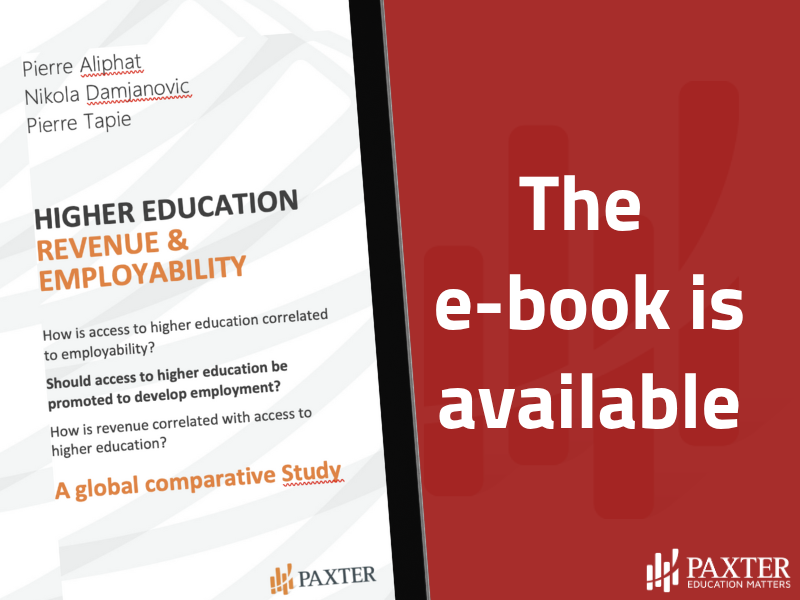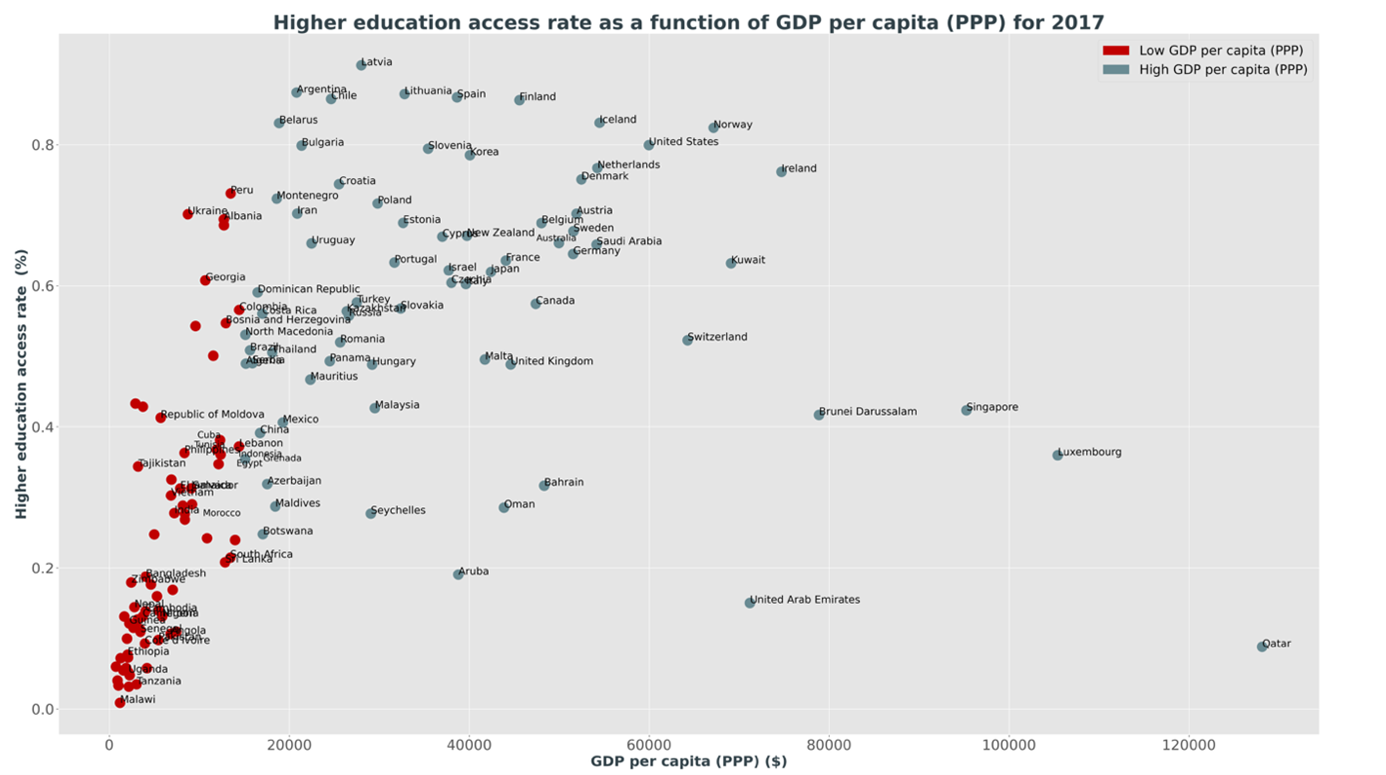Front-page news
Demographics & statistics
10 mn
“Higher education, revenue & employability”: discover the Paxter's groundbreaking global study

By Laetitia Aroichane
On July 2 2025, Paxter, a consulting firm specializing in academic strategy and pedagogical engineering, publishes the result of ten years of research : a comparative international study on the correlations between economic development, access to higher education, and employability.
A new perspective on the global challenge of higher education
How is access to higher education correlated to employability ? Should access to higher education be promoted to develop employment? How is revenue correlated with access to higher education ?
The result of ten years of research, Paxter’s study analyses economic, demographic, and educational data across 140 countries, representing over 90% of the world’s youth. By comparing these figures, Pierre Aliphat, Nikola Damjanovic, and Pierre Tapie provide a well-documented, international perspective on the true correlations between economic development, access to higher education, and employability—yielding surprising results. The authors of the study thus challenge certain preconceived ideas.
To read the full study :
- Download the document in PDF format
- Read the e-book
Introduction to the study by Pierre Aliphat, Nikola Damjanovic et Pierre Tapie
"As a space of learning, Higher Education carries multiple missions: the transmission of knowledge and culture; the intellectual formation of students and the development of their critical thinking; the acquisition of cognitive knowledge, disciplinary expertise, an understanding of civic life, and a sense of citizenship. Moreover, it is tasked with conferring skills that are relevant from both economic and societal standpoints, which will build graduates’ employability and their capacity to contribute to economic and social development.
The following research monograph, the results of which may come as a surprise for some, was initiated ten years ago, sparked by a piece of information that runs counter to intuition most French people have. In the countries of the 2011 Arab Spring, on the southern shore of the Mediterranean, the unemployment rate among young graduates was on average 50% higher than that of young people in general; and holding a degree appeared to be a disadvantage in the search for employment. Combined with the perception among parts of the youth population that civic freedoms were insufficient, this situation was one of the underlying causes of the acts of despair that rapidly spread throughout the region, eventually evolving into a large-scale political movement. Meanwhile, the authors of this study were immersed, in France, in the seemingly self-evident notion that expanding access to higher education was the pathway to lowering unemployment and fostering economic growth.
This work therefore arose from the apparent dissonance between this observed phenomenon and a widely helf French conviction. Paxter, a consultancy firm specialising in academic strategies and pedagogical engineering, has developed its own independent research production in order to strengthen its expertise. The relationship between income, employment, and higher education thus emerged as a key question to be explored.
We have chosen to communicate our findings according to the principles of open science. It would have been possible, perhaps, to extract several articles from this body of work for publication in academic journals. However, the simultaneous publication of the entirety of our findings, each shedding light on different facets of the issue under investigation, seemed to us more meaningful and more closely aligned with the role research plays in our consulting mission.
At the time of releasing this work, the brutal attacks on universities, research, and science by the new administration of a major scientific nation caused us to hesitate. As professionals in higher education and research, did we have the moral right to publish results that could potentially be misused by forces hostile to the pursuit of objective knowledge and a rational understanding of the world, some of which would even go so far as to destroy essential experimental data ?
In the end, if we have decided to publish this body of work, it is precisely because we are convinced that knowledge is preferable to ignorance, that scientific research based on facts and rational analysis helps every human community to progress, regardless of its initial mental biases; that investment in research, provided it is of high quality, is what will drive both innovation and societal resilience. Our approach is solely grounded in the observation and objective analysis of reality, without preconceived ideas or premature conclusions. If our results could surprise some readers, particularly in developed countries, they can rest assured that they have been produced with the sole ambition of understanding and submitted to the scientific community to shed new light on certain issues. We will be most pleased by exchanges that may arise from this work.”
Excerpt from the study: the relationship between a country’s level of economic development and access to higher education
“This body of work examines the relationship between young people’s access to higher education, average revenue in a country, and employability. Though this subject has so far been addressed in the literature mainly at a national level, this monograph seeks to explore these correlations from an international perspective.
The variables considered in this work are : GDP per capita expressed in purchasing power parity (GDP per capita (PPP)), the access rate to higher education, general unemployment rates, graduate unemployment rates, non-graduates unemployment rates, youth unemployment rates, young graduate unemployment rates, and young non-graduate unemployment rates.
The innovative aspect of our study lies essentially in the extensive dataset analyzed, covering a group of countries representing over 90% of the global youth population, and for which we were able to restate the rates of access to higher education one by one. Our results suggest that beyond the level of education, it is the relevance of qualifications to employment and the stage of a country’s economic development that determines employability.
We approached this research through five sequential questions :
Question 1: How is a country’s level of economic development correlated to its rate of access to higher education?
To address this, we examined potential correlations among the 140 countries for which this data was simultaneously available. We identified a strong correlation with a coefficient of R = 0.72. We also found that oil-producing countries and certain financial hubs exhibited "outlier" behaviors. Indeed, their access to higher education rates were low, relative to their levels of economic development.
This can be explained by the fact that, in oil-producing countries, oil extraction does not require a highly skilled workforce. In the case of financial hubs, financial transactions artificially inflate GDP per capita (PPP). By excluding nine countries from these two categories deemed atypical, the correlation among the remaining 140 countries between economic development and access to higher education is particularly strong (R = 0.84).
Furthermore, considering all countries with low GDP per capita (PPP), the correlation for those below the median ($15,000) is stronger than that for all 140 countries (R = 0.78 instead of 0.72). For those with GDP per capita above $15,000, economic development and access to higher education are not statistically correlated. Thus, if a relationship exists between economic development and access to higher education for countries with low economic development, beyond a medium level of development ($15,000), economic development and the rate of access to higher education become independent.”

Higher education access rate as a function of GDP per capita (PPP) (2017)
Other articles will later present additional parts of this study.
To read the full study :
- Download the document in PDF format
- Read the e-book
A publication for all, to be widely shared
Designed to be shared, analysed, and discussed, Paxter’s publication aims to fuel collective reflection. It can be widely distributed to enrich analyses of education policies, support seminars or strategic projects, and inspire discussions within institutions.
Any questions or feedback about the publication ? The Paxter team would be happy to engage with anyone interested. Contact us.
In the press and media
- 15/07/25 : Worldwide, economic results uncorrelated with the rate of access to higher education (Paxter study) - article of Newstank Academic
By Laetitia Aroichane
All topics
- France: future, opportunities & strategy
- Cost & financing
- Demographics & statistics
- Qualifications & accreditations
- Higher education institutions & Territories
- Equality
- Teaching, Pedagogy & Digital technology
- Environment & CSR
- Lifelong education and training
- Laws & Regulations
- Labour market, Professionalisation & Entrepreneurship
- International mobility & Attractiveness
- Higher education worldwide
- Research & Innovation
- Secondary education & Access to higher education

